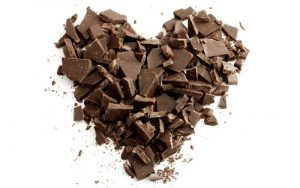Chocolate: enemy or ally?

In honor of Valentine’s Day being this week, and also because we just love chocolate, we want to put to rest the myth that chocolate, while tasting oh-so-good, is bad.
Chocolate is actually made from plants, meaning it contains many similar health benefits of dark vegetables. The benefits derive from flavonoids, which act as antioxidants. Little known fun fact: chocolate has about 8 times the number of antioxidants as strawberries!
Now don’t start thinking you’re in the clear to each chocolate all day long! With any sweet treat, moderation is the name of the game. And of course, there is a catch. With all the types of chocolates out there, there is just one you can stem to benefit from, and that is Dark Chocolate.
Dark chocolate is actually good for the heart, and a small bar of it each day can help keep your cardiovascular system running well.
Dark chocolate benefits include:
- Lower Cholesterol: it has been known to reduce LDL cholesterol (the “bad” cholesterol), by up to 10%.
- Lower Blood Pressure: studies show that consumption of a small bar of dark chocolate each day can reduce blood pressure in those with high blood pressure.
- Dark chocolate stimulates endorphin production, which gives off a feeling of pleasure
- Dark chocolate contains serotonin, which acts as an anti-depressant
BUT ISN’T CHOCOLATE REALLY FATTENING?
GOOD NEWS! Some of the fats in chocolate do not impact your cholesterol. The fats in chocolate are 1/3 oleic acid, 1/3 stearic acid, and 1/3 palmitic acid.
OK, WHAT DOES THAT MEAN?
Oleic Acid is a healthy monounsaturated fat, also found in olive oil.
Stearic Acid is a saturated fat, but research shows it has a neutral effect on cholesterol.
Palmitic Acid is also a saturated fat, but it does raise cholesterol and the risk of heart disease, which means that only 1/3 of the fat in dark chocolate is bad for you.
SO HOW DO I GO ABOUT INCORPORATING THIS?
A. WATCH THE CALORIES: This wonderful news does not mean that eating a pound of dark chocolate each day is okay. Chocolate is still a high-caloric, high-in-fat- food. The majority of studies done used no more than 3.5 ounces of dark chocolate a day to get the benefits.
B. THIS ONLY INCLUDES DARK CHOCOLATE: This is because dark chocolate has far more antioxidants than milk or white chocolate, which cannot make any health claims. Dark chocolate has 65%+ cocoa content.
C. SKIP THE NOUGAT: Look for pure dark chocolate or dark chocolate with nuts, orange peel, ginger, or other flavorings along those lines. Avoid dark chocolate with nougat, caramel, or other fillings. These just add to the sugar and fat content which will be counter-productive to the many benefits of the dark chocolate.
So when giving or receiving that loving heart shaped box of treats this February 14, remember to go for the dark!
Happy Valentine’s Day!

